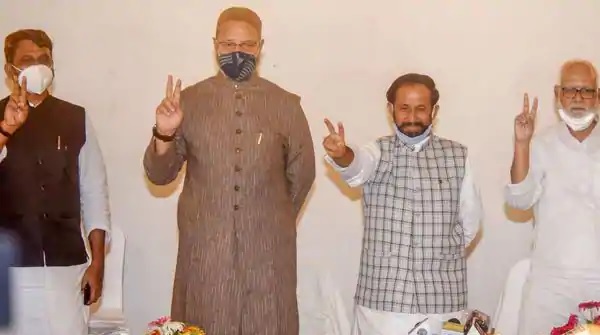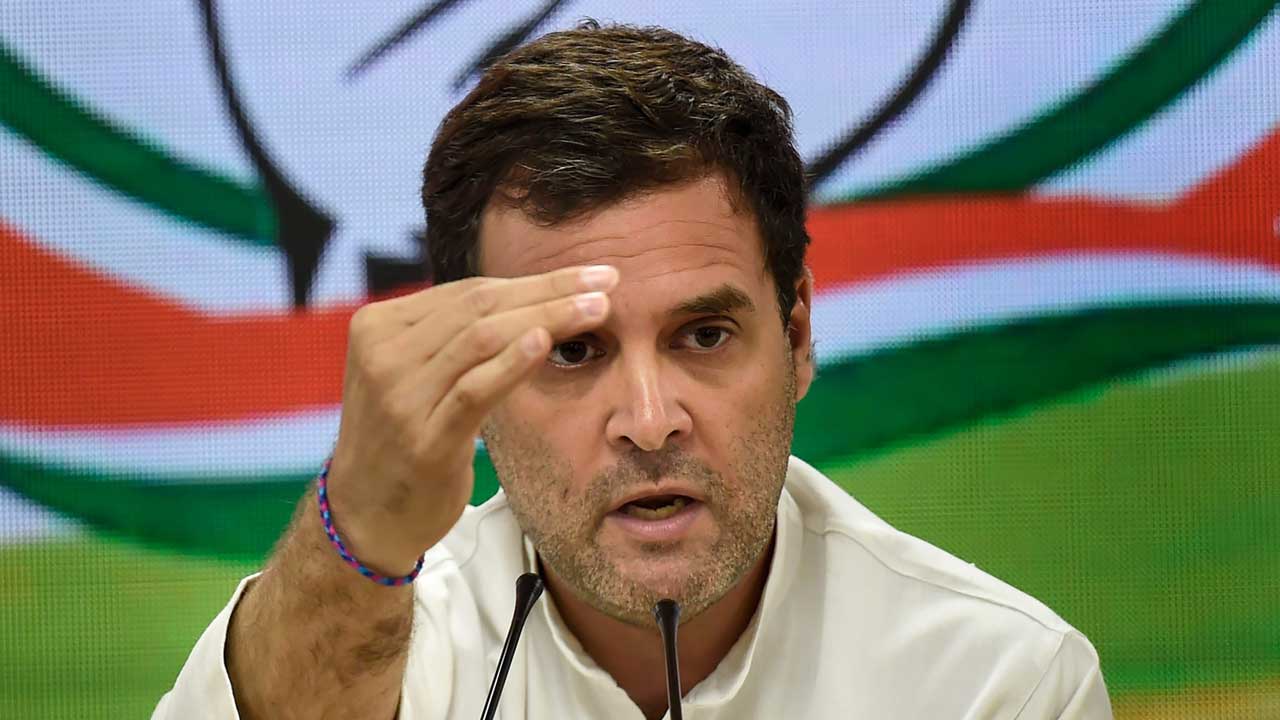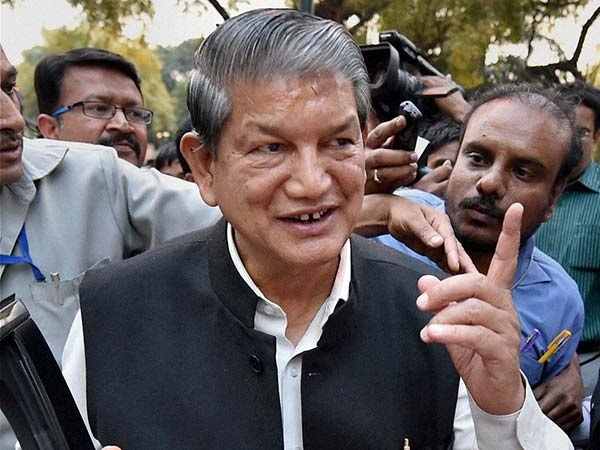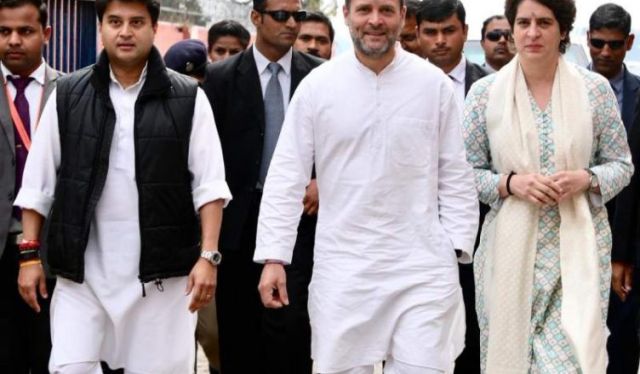
by admin | May 25, 2021 | News
 Among the Muslim winners, 8 are from RJD, 5 from AIMIM of Asaduddin Owaisi, 4 from Congress and 1 each from BSP and CPI-ML(L)
Among the Muslim winners, 8 are from RJD, 5 from AIMIM of Asaduddin Owaisi, 4 from Congress and 1 each from BSP and CPI-ML(L)
Mumtaz Alam | New Delhi
Even though the All India Majlis-e Ittehadul Muslimeen or AIMIM added a new chapter to its history on Tuesday when it won five Assembly seats in Bihar, its highest number ever outside Hyderabad, the overall strength of Muslim MLAs in the new Assembly went down by five compared to the 2015 Assembly elections.
The counting of votes that began at 8 a.m. on Tuesday continued till late night. As per the results available on the website of the Election Commission of India by 11 PM, as many as 19 Muslim candidates from different parties were either declared winner or were leading.
Among the Muslim winners, 8 are from RJD, 5 from AIMIM of Asaduddin Owaisi, 4 from Congress and 1 each from BSP and CPI-ML(L).
RJD, Congress and three left parties – CPI, CPI-M and CPI-ML(L) had fought this poll together.
| Muslim Winners in Bihar Assembly Elections 2020 |
| Name |
Constituency |
Party – Victory Margin |
Runner-up |
| Akhtarul Iman |
Amour |
AIMIM – 52515 |
JDU |
| Abidur Rahman |
Araria |
Congress – 47936 |
JDU |
| Md Anzar Nayeemi |
Bahadurganj |
AIMIM – 34097 |
VIP |
| Syed Ruknuddin Ahmed |
Baisi |
AIMIM – 16373 |
BJP |
| Mahboob Alam |
Balrampur |
CPI-ML(L) – 53597 |
VIP |
| Md Zaman Khan |
Chainpur |
BSP – 24294 |
BJP |
| Md Kamran |
Gobindpur |
RJD – 33074 |
JDU |
| Shahnawaz |
Jokihat |
AIMIM – 7383 |
RJD |
| Shakeel Ahmed Khan |
Kadwa |
Congress – 25569 |
LJP |
| Md Israil Mansuri |
Kanti |
RJD – 10314 |
IND |
| Md Afaque Alam |
Kasba |
Congress – 17278 |
LJP |
| Izharul Hussain |
Kishanganj |
Congress – 3858 |
BJP |
| Md Izhar Asfi |
Kochadhaman |
AIMIM – 36143 |
JDU |
| Shamim Ahmed |
Narkatia |
RJD – 27791 |
JDU |
| Ali Ashraf Siddiqui |
Nathnagar |
RJD – 7756 |
JDU |
| Mohammad Nehaluddin |
Rafiganj |
RJD – 9429 |
IND |
| Akhtarul Islam Shaheen |
Samastipur |
RJD – 4714 |
JDU |
| Yusuf Salahuddin |
Simri Bakhtiarpur |
RJD – 1767 |
VIP |
| Saud Alam |
Thakurganj |
RJD – 23887 |
IND |
Updated at: 11 PM, November 10
In the 2015 Assembly elections, 24 Muslim candidates from different parties had won – 12 of them were from RJD, 6 from Congress, 5 from JDU ticket and 1 on the ticket of CPI-ML(L).
In 2015, JDU was part of the RJD-led Mahagathbandhan but this time it contested as alliance partner of BJP. Though JDU had fielded around one dozen Muslim candidates in this election, yet none could win.
The 2015 performance of minority candidates was their best since the February 2005 Assembly polls.
| Muslim Representation in Bihar Assembly (2005-2020) |
|
|
Party-wise Muslim MLAs |
|
|
2005 (Feb) |
2005 (Oct) |
2010 |
2015 |
2020 |
| Party |
Tally |
|
|
|
|
|
| RJD |
75 |
10 |
54 — 04 |
22 — 06 |
80 — 12 |
|
| JDU |
55 |
04 |
88 — 04 |
115 — 07 |
71 — 05 |
|
| Congress |
10 |
03 |
09 — 04 |
04 — 03 |
27 — 06 |
|
| NCP |
03 |
02 |
01 — 01 |
|
|
|
| CPIML |
07 |
01 |
05 — 01 |
|
03 — 01 |
|
| BSP |
02 |
01 |
|
|
|
|
| SP |
04 |
01 |
|
|
|
|
| LJP |
|
|
10 — 01 |
03 — 02 |
|
|
| BJP |
|
|
|
91 — 01 |
|
|
| IND |
17 |
01 |
10 — 01 |
|
|
|
|
|
|
|
|
|
|
|
|
|
|
|
|
|
| Total |
|
23 |
16 |
19 |
24 |
|
As for overall tally of political parties, RJD has emerged as the single largest party with 76 seats (results of 60 declared) followed by BJP with 73 seats. While JDU has won or are leading on 43 seats, Congress could win only 19 seats. As a pre-poll alliance, BJP-JDU alliance has almost crossed the magic figure of 122 while RJD-led alliance may get 112 seats. By 11:25 PM, ECI had declared the results of only 188 seats out of total 243.

by admin | May 25, 2021 | Books, Opinions

(Following are excerpts from two chapters – �Highs in Delhi, Lows in Bihar and �The Rising Stars of Bihar Politics of �Gopalganj to Raisina: My Political Journey, a memoir by Lalu Prasad Yadav, President of the Rashtriya Janata Dal, a former Chief Minister of Bihar and former Railways Minister. It is published in English and Hindi by Rupa Publications and is priced at Rs 500. The excerpts are being carried with the permission of the publisher.
HIGHS IN DELHI, LOWS IN BIHAR
I was determined to see the end of the BJP-led government at the Centre, because I believed that both Bihar and the rest of the country had suffered as a consequence of this party’s rise. Central leaders, especially those belonging to Bihar, had been placing obstacle after obstacle in the smooth functioning of the state government under Rabri Devi. Nationally, there was a sense that the oppressed classes as well as the minorities were getting a raw deal. Besides, the BJP had become overconfident, and that had led to arrogance among many of its leaders. It was this mix of overconfidence and arrogance which led the BJP to launch the �India Shining’ campaign. The party was under the illusion that its victory in the 2004 Lok Sabha polls was a mere formality, and that Vajpayee was certain to return to power. I was to play a crucial role in bringing the curtains down on the Vajpayee Government.
It may be recalled that I had helmed a partnership between the RJD and the Congress. My popularity among the people of the state, the tireless efforts of my party workers, the work put in by my allies — all combined to bear fruit. We pulled off a miraculous victory, winning 29 of the 40 Lok Sabha seats in truncated Bihar, after the creation of Jharkhand. The RJD alone secured 22 seats. Paswan’s LJP and the Congress won four and three seats, respectively. The BJP and the Janata Dal (United) — the Samata Party had merged with the JD(U) — had to be content with just six and five seats, respectively.
The poor show of the BJP-led alliance in Bihar contributed significantly to its overall low tally of seats nationwide, leading to its exit from power. I had not only kept the RJD flag flying high at a time when most observers thought that the Vajpayee-led BJP would triumph, but also facilitated the return of the Congress to power after a gap of eight years — its last regime was that of P.V. Narasimha Rao’s, whose tenure ended in 1996.
Perhaps, even more than some Congress leaders, I was eager to make Sonia ji the country’s next prime minister. Over the years, the RJD’s bonds with the Congress had strengthened. At a time when a section of senior Congress leaders was opposed to her leadership, and partners were unsure of their continuance in the Congress camp, the RJD had emerged as the most credible ally of the Congress. The Congress-RJD partnership was — and is — based on a common ideology to promote secularism and save the idea of India, as enshrined in our Constitution.
Months after taking over as Congress president, Sonia Gandhi had successfully contested the Rae Bareli Lok Sabha seat from Uttar Pradesh and debuted in Parliament. The constituency had sentimental value for her; it had been represented by her mother-in-law and former prime minister, Indira Gandhi. Thereafter, in 1999, Sonia Gandhi became the Leader of the Opposition in the Lok Sabha. She had criss-crossed the country, campaigning on the theme of aam aadmi (common man) to blunt the BJP’s India Shining campaign. Despite her relative inexperience in electoral politics, she played a leading role in the Congress’s comeback to power in 2004. I was the backbone of the �common man’ drive; after all, it was this section of society, the aam aadmi, to whose upliftment I had devoted my political career. Sonia ji had surprised not just her opponents, but also many of those from within her party with the seasoned manner in which she led the Congress campaign, overcoming many hurdles along the way, including her �acceptability’ and the language constraints.
Obviously, she was best suited to replace Vajpayee as prime minister. Not surprisingly, the newly-elected Congress MPs unanimously elected her their leader and pitched for her to be the new prime minister. But Sonia ji, in a dramatic manner, refused to accept the mantle. There has been much speculation since then on why she let go of the opportunity. But whatever the reasons, she declined and suggested the name of Dr Manmohan Singh-a veteran economist with vast experience in governance-as her prime ministerial choice. The Congress MPs were deflated, and very reluctantly accepted Dr Singh’s name. Readers will recall the dramatic scenes that were witnessed on the day when Sonia ji declined to become the prime minister. It is not that Congress leaders did not like Dr Singh. They had high regard for him, and they hadn’t forgotten the time when he, as the country’s finance minister in Rao’s government, had turned around the economy, bringing it back from the brink of collapse. However, they had fought the elections under Sonia Gandhi’s leadership and wanted her to lead the country.
While Congress leaders were reconciling to the situation, I was adamant. I had 22 MPs from the RJD, and believed that it would be a personal victory for me if Sonia ji, against whom the NDA had used disrespectful language besides conducting a malicious campaign against me, were to become the prime minister. I was in no mood to accept anyone other than her. Sonia ji called me up first. She insisted on my accepting Dr Singh as the prime minister. I refused. Then, she came to my residence, accompanied by Dr Singh, and sought to reason with me. She even made Dr Singh request me to accept him as the prime minister. I was in a fix. On the one hand, I was hell-bent on seeing her as the new prime minister. On the other hand, I could not turn down her request, more so because she had taken the trouble to visit my residence along with Dr Singh. I finally relented, and Manmohan Singh became the PM. Sonia ji took charge as chairperson of the Congress-led United Progressive Alliance (UPA), which had many parties, including the RJD, as part of the government
DYNASTRY POLITICS: MUCH MALIGNED
With my three children, Misa, Tej Pratap and Tejashwi, becoming active in politics, my opponents began to attack me for promoting what they called dynasty politics. These are baseless and uncalled-for allegations. As parents, we are supposed to help our children in pursuing their passion. Usually, children are influenced by the atmosphere they are born and brought up in. I don’t find anything wrong with the progeny of lawyers, doctors, writers and professors adopting the vocation of their parents. Parents are, after all, duty-bound to help their children pursue the career of their choice. Rabri and I never interfered with Misa when she was doing her MBBS course. We didn’t interfere with Tejashwi’s passion for cricket. Tej Pratap is good at playing the flute, apart from working for the party. They are all adults, doing what they like. We, of course, supported and guided them when they showed an inclination towards politics.
There are several instances in other parties, where leaders have promoted their children in politics. I find nothing wrong with it. I was a poor cowherd’s son. I had not inherited politics from my family. I struggled hard to gain acceptance and recognition from the people. Some elections I won, others I lost. But I never cast aspersions on any of my political opponents for promoting their sons and daughters in politics, even when my children were young and not in politics. In fact, readers will recall, I joined student politics well before I was married to Rabri Devi. Misa was born when I was in jail in 1975. She was barely two years old when I was elected an MP from Chhapra in 1977. My other children were not born then. I don’t believe in the petty politics of attacking my opponents simply because their sons and daughters are in politics. I don’t care if someone attacks me, for I know that my children, after attaining adulthood, have chosen the vocation of their liking.
Moreover, I have promoted hundreds of youth-particularly belonging to the oppressed and minority communities-in politics. More than 60 per cent of the 80 MLAs of our party are new entrants to politics. I have identified fresh political talent among the weaker sections and have guided them. It is not proper to name my peers, but I have given tickets to the sons and daughters of many of my contemporaries to contest elections. We cannot stop change. The new generation is better at connecting with the youth and getting to know their aspirations.
–IANS

by admin | May 25, 2021 | Business
New Delhi : Congress President Rahul Gandhi on Thursday promised incentives for entrepreneurs and start-ups to boost job creation in the country, saying there will be no permissions required for the first three years of any new business, no angel tax and sold incentives based on the number of jobs created.
He also promised easy bank credit if the party is voted to power in the Lok Sabha elections.
“Youngsters, Want to start a new business? Want to create jobs for India? Here’s our plan for you: 1. ZERO permissions for the first 3 years of any new business. 2. Goodbye Angel Tax 3. Solid incentives & tax credits based on how many jobs you create. 4. Easy Bank Credit,” Gandhi said in a tweet.
The move is seen as an effort by Gandhi to woo the youth ahead of Lok Sabha elections and keep the focus on economic issues.
Gandhi has been criticising the ruling BJP and Prime Minister Narendra Modi for failing to create promised jobs and the issue is a major poll plank of the Congress .
The promises are part of Congress plan to boost employment opportunities if it comes to power and provide a viable roadmap to achieve the objectives.
–IANS

by admin | May 25, 2021 | News, Politics

Harish Rawat
Dehradun : Congress General Secretary Harish Rawat on Friday said the party will launch sincere efforts to build a grand Ram Temple at Ayodhya if it comes to power after the Lok Sabha elections.
“On two previous occasions, the Congress made sincere attempts to build the Ram temple when it was in power. We will sincerely launch efforts to build the Ram temple if we come to power,” Rawat told reporters here.
Asked whether this the party’s official stand, Rawat quipped: “My statement regarding the Ram temple was widely reported in the media. There is no denial from the Congress.”
He accused the Bharatiya Janata Party (BJP) of being insincere on the issue. “BJP is only doing politics on the Ram temple issue,” said Rawat. The government must work as a facilitator for building the temple, he said.
On the Pulwama suicide bombing, Rawat accused the BJP of projecting Prime Minister Narendra Modi as the only nationalist in the country.
“I have strong objections on the projection of Modi as the only nationalist in India. We all are nationalists. Everybody in the country is a nationalist,” Rawat said.
Criticizing the Uttarakhand BJP government on its budget presented this week, Rawat said the declining agriculture and manufacturing growth in the state was a matter of grave concern.
He said nearly a dozen factories had been closed in the state after the November 7 investors meet. He also claimed that of the nine lakh farmers in the state, 50,000 have quit farming in the past two years.
Rawat said the government’s decision to relax the stringent land laws would force the people to migrate to other states.
“Top industrialists like Adani and Ramdev would buy all the land. There will be no land left for living,” said Rawat.
—IANS

by admin | May 25, 2021 | Opinions, Politics
 By Saeed Naqvi,
By Saeed Naqvi,
The ghastly news from Kashmir did cast a shadow, otherwise Lucknow has had a festive February. The first week was filled with the five-day annual Sanatkada jamboree with fabled Baradari as the festooned focal point. While the mood still lingered, the city found itself riveted on Priyanka Gandhi’s roadshow with her brother and Congress President Rahul Gandhi in tow.
Those who had expressed doubts about her ability for hard work must have gasped: she interviewed candidates all night. Never mind if many of them did not come out with flying colours: some did not know basic facts about their respective constituencies.
Diplomats, who would normally send their Indian staff to study the local mood, have turned up themselves. While the Congress office at the Mall Avenue is crawling with aspiring netas, Taj hotel, where both Priyanka and Jyotiraditya Scindia are staying, has enough security to annoy the hotel’s other guests. Has security obstructed Priyanka kicking off the campaign with a dip in the Ganga during Kumbh? Congress choreographers had also floated the idea that a visit to a temple in Srinagar would authenticate her Kashmiri lineage. Who knows, that expedition may still be undertaken.
If arithmetic alone were to determine electoral outcomes, the Samajwadi Party-plus-Bahujan Samaj Party arrangement in Uttar Pradesh is formidable. But the chemistry of their workers at the constituency level has been adversarial.
True, grassroots workers are grappling with instructions from their leaders to tone down their animosities. But there are other complications, particularly in Akhilesh Yadav’s camp. His uncle, Shivpal Yadav, is not reconciled to Akhilesh Yadav’s unbridled control over the SP apparatus. So he has opened his own shop to trade his dwindling clout at the grassroots with anybody eager to damage the SP-BSP alliance. The Bharatiya Janata Party (BJP) is so flushed with funds that it will loosen all its purse strings for Shivpal Yadav’s anti-Akhilesh mission. The choice is Shivpal Yadav’s: pocket the money or waste it.
Meanwhile, Mulayam Singh Yadav, founder of SP, is so torn between his son and younger brother that he waffles something in favour of both alternately. In Parliament last week he left Sonia Gandhi, like everyone else, in a state of wonder. Making eye contact with a grinning Narendra Modi he said: “May you come back to power”. The ear-to-ear smile on Mulayam Singh Yadav’s face was interpreted by most as a clue to a deep understanding. He has so far been protected from the Enforcement Directorate.
“We shall not be on the back foot,” was Rahul Gandhi’s reaction to the insult heaped on the Congress by SP-BSP distributing nearly all the 80 seats among themselves, leaving two each for the Congress and the Rashtriya Lok Dal (RLD). He virtually advanced his proprietary claim on Uttar Pradesh by announcing that his party would contest all 80 seats.
In making this announcement Rahul Gandhi fell back once again on a delusion the party has nursed ever since it dropped to 140 seats after the Babari Masjid debacle. It is aching to revive. It is well nigh impossible for this desire to be fulfilled. A political party waxes and wanes, revives and loses, is up and down alternatively only in a two party system. In a country with 31 states, each with its own shade of politics, the seesaw model cannot work. The Congress must recognize the reality of a federal India. Otherwise it will continue to reset its target. Let me explain.
For 2019, the declared aim of all parties is to remove the BJP. Mamata Banerjee has grasped the reality. At the meeting called by the Aam Aadmi Party (AAP) on Jantar Mantar Road, she said that all regional parties must fight the BJP from their respective states and regions. “The Congress should fight from Madhya Pradesh, Rajasthan, Chhattisgarh – states where it has shown that it is strong.”
The Congress is uncomfortable being so circumscribed. It will not recover from a hangover of years long past when it was the only political party. In its origins, it represented diverse interests federated behind a programme for freedom. Subsequently, almost every political party came out of the Congress womb. Once Krishna Menon, Congressman closest to the Communists, and S.K. Patil, far right capitalist, fought the 1957 election on Congress ticket from different districts of Bombay (Mumbai).
In time, disparate interests, glued together, splintered. In 1967, eight Indian states had non-Congress governments. But the Congress remained in power in the centre for a simple reason: its social base remained relatively cohesive. But when in 1990, with Mandal Commission report giving reservations in government jobs to the OBCs whipping up the tempo of caste politics in North India, the Ram Janmabhoomi agitation was dusted up to promote Hindu consolidation. This would minimize the settlement at the lower reaches of the caste pyramid. Hindu consolidation would be best affected by bringing out the “other” in bolder relief. I have always believed that in India communal politics is a strategy to manage caste upheaval.
The unease in Hindu-Muslim relations since Partition exploded into full blown communalism in the 90s. It peaked with the demolition of the Babri Masjid on December 6, 1992, the blame for which the minorities placed at the Congress Prime Minister’s door. The Muslim voter left the Congress en masse. In the 1996 elections, the Congress was down to its lowest Lok Sabha tally ever — 140 seats. It hovered around that figure, leapt to 206 in 2009 (for a range of reasons) and dived to 44 in 2014. Post 9/11 global Islmophobia was a Godsend to Hindutva, compelling the Congress into temple hopping and relentless cow worshiping for sheer survival.
There are reasons to believe that the BJP will not be able to repeat its 2014 performance in 2019. The nation is, therefore, headed for two distinct coalitions, facing each other across the aisle. One coalition will be led by the BJP. It is to make sure that it alone leads the other coalition that the Congress is playing risky games in Uttar Pradesh, Delhi and to some extent West Bengal. In these states it is either threatening or fighting formations implacably opposed to the BJP.
(Saeed Naqvi is a commentator on political and diplomatic affairs. The views expressed are personal. He can be reached on saeednaqvi@hotmail.com)
—IANS
 Among the Muslim winners, 8 are from RJD, 5 from AIMIM of Asaduddin Owaisi, 4 from Congress and 1 each from BSP and CPI-ML(L)
Among the Muslim winners, 8 are from RJD, 5 from AIMIM of Asaduddin Owaisi, 4 from Congress and 1 each from BSP and CPI-ML(L)



